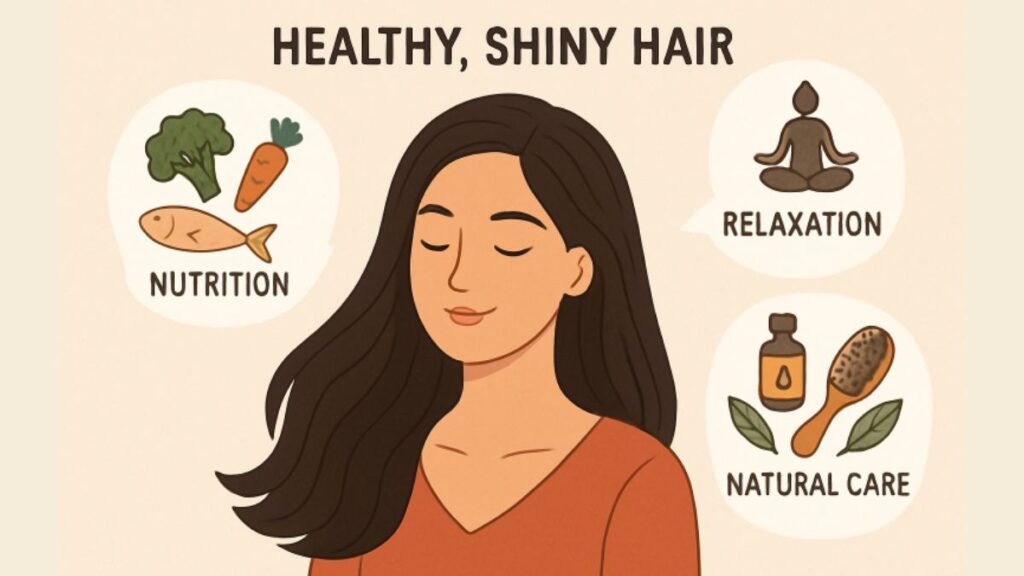Hair health goes far beyond the surface, reflecting how our bodies function on a deeper level. For many women, maintaining strong, vibrant hair means focusing not only on external treatments but also on factors like nutrition, hormonal balance, and emotional well-being. A holistic approach ensures that the root causes of hair concerns are addressed for long-term results. For those looking to boost hair vitality, incorporating targeted supplements for women’s hair growth can be a supportive addition to daily routines.
Understanding the link between overall health and hair quality can empower you to make sustainable choices. From managing your diet to your stress levels, every lifestyle decision impacts hair wellness. In particular, adopting proactive measures, embracing natural remedies, and mindfully protecting your hair from environmental stresses play pivotal roles in achieving and maintaining healthy hair.
As you explore these holistic strategies, remember that every woman’s journey to hair wellness is unique. While some individuals might see quick improvements, others may require a more patient and consistent approach before noticing tangible results. If you find your hair condition worsening or accompanied by other health symptoms, consult a healthcare professional for proper assessment and guidance.
This guide will provide a comprehensive roadmap, including nutritional insights, natural treatments, stress management techniques, and when to seek professional help to achieve lasting, vibrant hair health.
Understanding Hair Health
The appearance and vitality of your hair often serve as indicators of internal balance—or imbalance. Genetics establishes a baseline for hair type and density, but environmental factors, nutrition, hormonal fluctuations, and emotional stress can dramatically impact hair quality and growth. Knowing these influences is fundamental to making effective changes. For example, stress can trigger temporary hair loss conditions like telogen effluvium, underscoring the need to manage both physical and mental wellness. According to WebMD, factors such as thyroid imbalance, anemia, or chronic stress may contribute to unexplained hair loss, and seeking early intervention can support timely recovery.
Nutritional Foundations for Healthy Hair
Diet is a cornerstone of hair wellness. Hair strands are primarily made up of keratin, a structural protein requiring steady intake of amino acids, vitamins, and minerals. Key nutrients include:
- Protein: Crucial for keratin production. Eat lean meats, eggs, legumes, and nuts.
- Iron: Important for delivering oxygen to follicles. Find iron in spinach, red meats, and fortified cereals.
- Biotin: Supports keratin infrastructure; sources are eggs, nuts, and sweet potatoes.
- Omega-3 Fatty Acids: Help combat inflammation in the scalp. Salmon, flaxseeds, and walnuts are rich sources.
- Vitamin D: Can stimulate dormant follicles. Get it from fatty fish and moderate sun exposure.
- Vitamin E: Protects hair from oxidative stress; almonds and avocados are excellent options.
- Zinc: Needed for follicle health. Found in chickpeas, pumpkin seeds, and shellfish.
Hydration is equally necessary, as dehydration impedes nutrient transport to hair cells. Aim for ample water intake daily.
Balanced, diverse meals improve hair and positively impact energy and immunity, according to Healthline.
Natural Remedies and Herbal Treatments
Natural treatments offer a gentle yet effective way to support hair wellness. Regular scalp massages with nourishing oils like coconut or argan oil can boost circulation, delivering nutrients to hair follicles and potentially encouraging growth. Aloe vera provides soothing relief for irritated scalps and can be used as a pre-shampoo mask. Applying herbal pastes made from fenugreek seeds strengthens roots and may reduce shedding.
Essential oils provide targeted benefits: rosemary oil may help stimulate growth, tea tree oil is popular for treating dandruff, and lavender oil is praised for its relaxation and scalp-soothing properties. Always dilute essential oils before applying them to the scalp and perform a patch test to avoid irritation. When used consistently, herbal and natural remedies can significantly support your holistic hair routine.
Lifestyle Adjustments for Hair Wellness
Busy lifestyles can quickly undermine hair health. By prioritizing regular exercise, women can improve circulation to the scalp and decrease overall stress levels, both of which are tied to stronger hair. Quality sleep—ideally 7 to 9 hours a night—is necessary for all cellular regeneration, including hair follicles. It’s also important to consciously avoid habits that harm hair, such as smoking and excessive alcohol use, which have been linked to thinning and slower hair growth.
Stress Management and Hormonal Balance
Chronic stress or sudden life changes can disrupt hair’s natural growth cycle, often leading to diffuse thinning or shedding. Incorporating daily stress-reducing activities, such as meditation, gentle yoga, or deep breathing exercises, helps keep cortisol and other stress hormones at healthy levels. Some herbal supplements, including ashwagandha and saw palmetto, may support hormonal equilibrium when used carefully. However, always consult a healthcare provider before starting new supplements, particularly if you have underlying health conditions or take medications.
Scalp Care and Protective Measures
Healthy hair starts at the scalp. Incorporate gentle exfoliation weekly using a scalp brush or mild scrub to help remove dead skin and prevent clogged follicles. Opt for shampoos and conditioners free from sulfates and harsh chemicals to maintain the scalp’s protective barrier. Wear hats or protective sprays designed to safeguard hair from environmental damage—UV rays, harsh winds, and pollution. These precautions can prevent breakage and dullness, supporting long-term vitality and resilience.
When to Seek Professional Help
If you experience sudden, excessive hair loss, patchy bald spots, or hair thinning accompanied by other symptoms (such as fatigue, weight changes, or skin issues), it’s best to see a dermatologist or healthcare provider. They can run diagnostic tests to identify causes like thyroid disorders, autoimmune diseases, or severe deficiencies—ensuring you receive personalized treatment and guidance.
Conclusion
True hair wellness stems from a holistic approach—combining optimal nutrition, stress management, mindful daily habits, and natural remedies. As you make these changes, remember that consistency and self-care are your strongest allies. By supporting your hair from the inside out and making thoughtful lifestyle choices, you empower yourself to enjoy healthier, more resilient hair for years.






